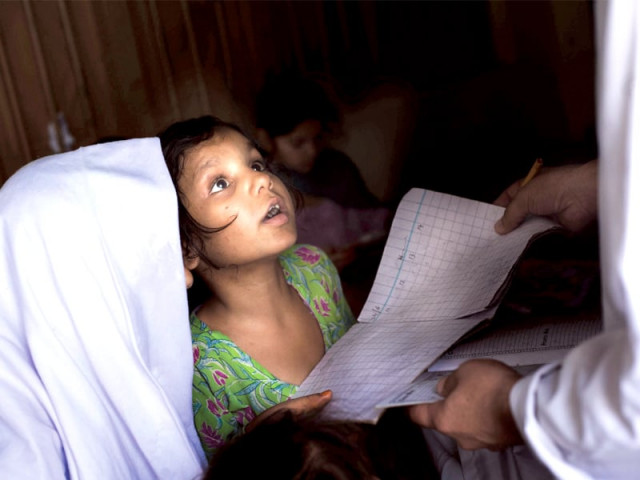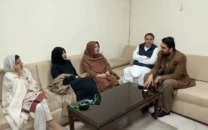Universal education: NGOs doing state’s job, but for how long?
After passing compulsory education bill in November, little follow-up from govt, NGOs cannot match state resources.

A student collecting her checked homework from a teacher . PHOTO: MYRA IQBAL/ EXPRESS
Idara-e-Taleem-o-Aagahi (ITA) Regional Manager Waqas Bajwa has spent the last decade fighting against the economic and cultural circumstances that snatch books and dreams out of the hands of children.
The bill has proven to be a disillusion for rights workers like him, mainly due to the lack of public debate after its passage, which could have provided an opportunity to discuss loopholes in implementation. “Will the schools find these children, or will the children leave their begging bowls through some divine intervention and seek out these schools?” he questioned.
Fazilat Mushtaq, 12, is new to the impoverished neighbourhood in Dhoke Darzian where ITA has had a presence since 2005, through a centre that imparts non-formal education and vocational training to children between four and 17 years of age. The Agahi centre is one of five such schools in the twin cities established in 2000.

Children share a laugh inside a classroom . PHOTO: MYRA IQBAL/ EXPRESS
The bullets and bigotry of Karachi may have forced Fazilat’s father to seek a secure environment for his children, but moving to a conservative locality on the fringes of Rawalpindi has reinforced traditional values.
“I can only study up to fifth grade,” Fazilat shared, with quiet resignation, and a curve in her lip that could almost be a smile were it not for the ambivalence in her eyes. Just a month ago, she was found begging outside a mosque.
Dhoke Darzian Agahi Centre Cluster Coordinator Muhammad Ali said, “The real challenge was to convince her father to let her attend a non-formal school at the cost of losing an ‘earning’ family member,” shared Ali, 25, whose struggle for an education inspired him to help others realise its importance.
Public schools with class sizes of 70 or more tend to have a harsh ‘no fee, no desk’ attitude towards such students, but ITA, after preparing its students for the competitiveness of educational institutions, takes it upon itself to mainstream the students into public and private schools in the area, depending on accessibility.
“The schools’ principals are motivated to absorb children at a lower fee or on scholarship in exchange for newer furniture and teacher training,” explained Bajwa. “Education is the government’s responsibility. Our goal is to help, but we can do so only within our means.”

The cost of maintaining a centre is around Rs35,000 per month, with funding coming from donors and the organisation itself. The number of centres has been slashed to five and teachers salary are a meagre Rs3,000, resulting in high turnover.
Bent over colourful desks to check the notebooks of his students, 32-year-old Faiz Ali Shah’s reward is in knowing that these children will be able to go to school from the basics that he spends hours teaching them in the scorching heat and shivering cold. An estimated 3,126 students have been elevated into full-time schools since the start of the project.
“We cannot be sure that Fazilat will continue school past fifth grade,” said Bajwa, “It is the government’s prerogative to change mindsets on a societal level.”
Published in The Express Tribune, July 22nd, 2013.



















COMMENTS
Comments are moderated and generally will be posted if they are on-topic and not abusive.
For more information, please see our Comments FAQ